Alexander Schmorell
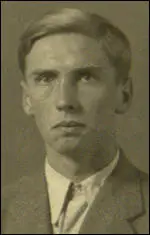
Alexander Schmorell, the son of Hugo Schmorell, a German doctor, was born in Orenburg, Russia, on 16th September, 1917. His mother, who was Russian, died of typhus during the Civil War when he was two years old. In 1921 his father took him to live in Harlaching, an affluent suburb of Munich. He grew up in the care of a Russian nurse who spoke no German. As a result he spoke Russian fluently. (1)
As a teenager, Schmorell was described as "tall, lean, had tawny brown hair; there was an ironic gleam in his gray eyes and he had a light, casual way that made people around him want to smile." (2)
Schmorell joined the Hitler Youth but he never enjoyed the "marching and singing and saluting". However, he volunteered to join the German Army and served with a horse-artillery unit. Schmorell was allowed to study medicine at the University of Munich. On the outbreak of the Second World War he became a member of the Second Student Medical Company. (3)
Alexander Schmorell at University
While at university he became friendly with Hans Scholl, Sophie Scholl, Christoph Probst, Willi Graf, and Jugen Wittenstein. Hans soon emerged as the group's leader: "The role was tacitly bestowed on him by virtue of that quality in his personality that, in any group, made him the focus of attention. Alex Schmorell was usually at his side, his close collaborator. Between them, they arranged for meetings and meeting places.... Sometimes they met in Hans' room for impromptu talk and discussion. For larger meetings, they gathered at the Eickemeyer studio or the villa of Dr. Schmorell, an indulgent father who shared many of his son's views." (4)
The group of friends soon discovered a professor at the university who shared their dislike of the Adolf Hitler and his Nazi government. Kurt Huber was Sophie's philosophy teacher. However, medical students also attended his lectures, which "were always packed, because he managed to introduce veiled criticism of the regime into them". (5) The 49 year-old professor, also joined in private discussions with what became known as the White Rose group. Hans told his sister, Inge Scholl, "though his hair was turning grey, he was one of them". (6)
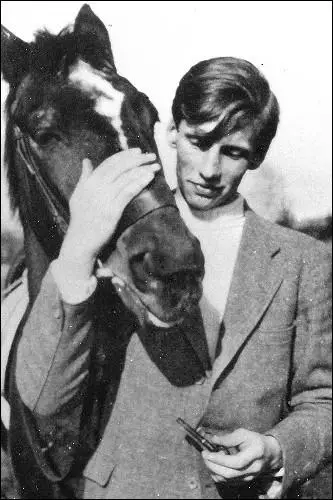
According to Elisabeth Scholl, the White Rose group was formed because of the execution of members of the resistance: "We learned in the spring of 1942 of the arrest and execution of 10 or 12 Communists. And my brother said, In the name of civic and Christian courage something must be done. Sophie knew the risks. Fritz Hartnagel told me about a conversation in May 1942. Sophie asked him for a thousand marks but didn’t want to tell him why. He warned her that resistance could cost both her head and her neck. She told him, I’m aware of that. Sophie wanted the money to buy a printing press to publish the anti-Nazi leaflets.” (7)
White Rose Group
Alexander Schmorell played a leading role in the White Rose discussions. He also brought in others into the group. This included Traute Lafrenz, who had been studying medicine in Hamburg before enrolling at the University of Munich for additional courses. "Traute Lafrenz would have been an asset and an ornament to any group, being both unusually bright and unusually attractive. There was nothing of the tamed and domesticated Kinder, Kuche, Kirche (children, kitchen, and church) ilk about her." (8)
Schmorell received a generous monthly allowance from his father and was able to buy a secondhand duplicating machine. He also bought a typewriter and got special printing paper and stencils. (9) It was said that Schmorell was constantly urging the group to make the transition from talk to action. "What are we waiting for? Until the war is over and everybody points to us and says we tolerated such a regime without protest?" (10)
In June 1942 the White Rose group began producing leaflets. They were typed single-spaced on both sides of a sheet of paper, duplicated, folded into envelopes with neatly typed names and addresses, and mailed as printed matter to people all over Munich. At least a couple of hundred were handed into the Gestapo. It soon became clear that most of the leaflets were received by academics, civil servants, restaurateurs and publicans. A small number were scattered around the University of Munich campus. As a result the authorities immediately suspected that students had produced the leaflets. (11)
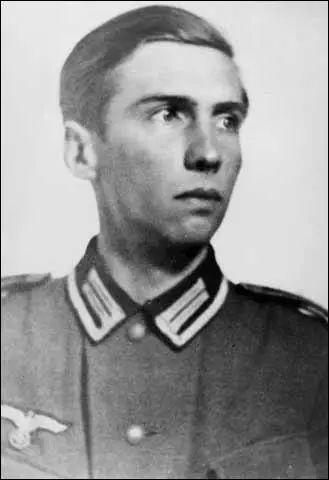
The opening paragraph of the first leaflet said: "Nothing is so unworthy of a civilized nation as allowing itself to be "governed" without opposition by an irresponsible clique that has yielded to base instinct. It is certain that today every honest German is ashamed of his government. Who among us has any conception of the dimensions of shame that will befall us and our children when one day the veil has fallen from our eyes and the most horrible of crimes - crimes that infinitely outdistance every human measure-reach the light of day? If the German people are already so corrupted and spiritually crushed that they do not raise a hand, frivolously trusting in a questionable faith in lawful order in history; if they surrender man's highest principle, that which raises him above all other God's creatures, his free will; if they abandon the will to take decisive action and turn the wheel of history and thus subject it to their own rational decision; if they are so devoid of all individuality, have already gone so far along the road toward turning into a spiritless and cowardly mass - then, yes, they deserve their downfall." (12)
Over the next three weeks the group produced three more leaflets. They claimed that the goal of the White Rose was to bring down the Nazi government. It suggested the strategy of passive resistance that was being used by students fighting against racial discrimination in the United States: "We want to try and show them that everyone is in a position to contribute to the overthrow of the system. It can be done only by the cooperation of many convinced, energetic people - people who are agreed as to the means they must use. We have no great number of choices as to the means. The only one available is passive resistance. The meaning and goal of passive resistance is to topple National Socialism, and in this struggle we must not recoil from our course, any action, whatever its nature. A victory of fascist Germany in this war would have immeasurable, frightful consequences. The first concern of every German is not the military victory over Bolshevism, but the defeat of National Socialism." (13)
In July 1942, Alexander Schmorell, Hans Scholl, Christoph Probst and Willi Graf, were sent to the Eastern Front as medics. During their time in Poland and the Soviet Union they witnessed many examples of atrocities being committed by the German Army which made them even more hostile to the government. They were also upset by having to treat so many wounded and dying soldiers. It became clear that Germany was fighting a war it could not win. (14)
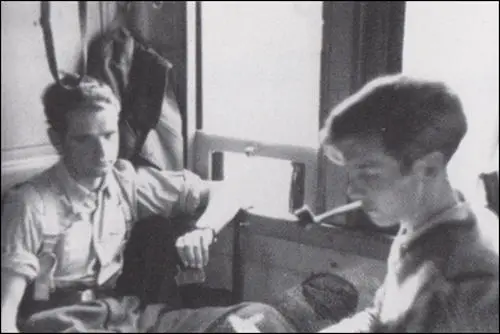
The first draft of the fifth leaflet was written by Sophie and Hans Scholl and Alexander Schmorell. (15) Kurt Huber then revised the material. The three men had long discussions about the content of the leaflet. Huber thought that the young men were "leaning too much to the left" and he described the White Rose group as "a Communist ring". (16) However, it was eventually agreed what would be published. For the first time, the name White Rose did not appear on the leaflet. The authors now presented them as the "Resistance Movement in Germany". (17)
This leaflet, entitled A Call to All Germans!, included the following passage: "Germans! Do you and your children want to suffer the same fate that befell the Jews? Do you want to be judged by the same standards as your traducers? Are we do be forever the nation which is hated and rejected by all mankind? No. Dissociate yourselves from National Socialist gangsterism. Prove by your deeds that you think otherwise. A new war of liberation is about to begin."
It ended with the kind of world they wanted after the war finished: "Imperialistic designs for power, regardless from which side they come, must be neutralized for all time... All centralized power, like that exercised by the Prussian state in Germany and in Europe, must be eliminated... The coming Germany must be federalistic. The working class must be liberated from its degraded conditions of slavery by a reasonable form of socialism... Freedom of speech, freedom of religion, the protection of individual citizens from the arbitrary will of criminal regimes of violence - these will be the bases of the New Europe." (18)
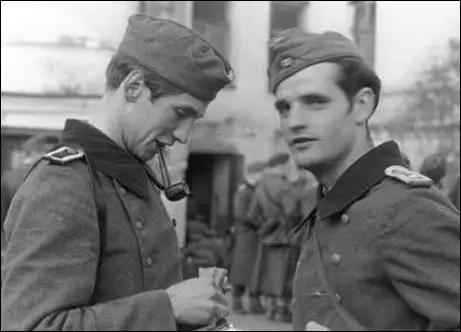
The Gestapo later estimated that the White Rose group distributed around 10,000 copies of this leaflet. Sophie Scholl and Traute Lafrenz purchased the special paper needed, as well as the envelopes and stamps from a large number of shops to avoid suspicion. Each leaflet was turned out one by one, night after night. "In order to stay awake and to function during the day, they took pep pills from the military clinics where the medics worked." (19) The conspirators had to ensure that the Gestapo could not trace the source to Munich so the group had to post their leaflets from neighbouring towns." (20)
The authorities took the fifth leaflet more seriously than the others. One of the Gestapo's most experienced agents, Robert Mohr, was ordered to carry out a full investigation into the group called the "Resistance Movement in Germany". He was told "the leaflets were creating the greatest disturbance at the highest levels of the Party and the State". Mohr was especially concerned by the leaflets simultaneous appearance in widely separated cities including Stuttgart, Vienna, Ulm, Frankfurt, Linz, Salzburg and Augsburg. This suggested an organization of considerable size was at work, one with capable leadership and considerable resources. (21)
Alexander Schmorell was introduced to Lilo Ramdohr by Falk Harnack. Lilo's husband, Otto Berndl, had been a member of the German Army and had been killed in the Soviet Union in 1941. (22) Lilo became very close to Schmorell and they used to paint together. (23) Schmorell talked about the dangers of being caught but was comforted by his religious beliefs: "I will rejoice in death because I know that life does not end." (24)
Arrest & Execution
On 13th January, 1943, the Gauleiter of Bavaria, Paul Giesler, addressed the students of University of Munich in the Main Auditorium of the Deutsche Museum. He argued that universities should not produce students with "twisted intellects" and "falsely clever minds". Giesler went on to state that "real life is transmitted to us only by Adolf Hitler, with his light, joyful and life-affirming teachings!" He went on to attack "well-bred daughters" who were shirking their war duties. Some women in the audience began calling out angry comments. He responded by arguing that "the natural place for a woman is not at the university, but with her family, at the side of her husband." The female students at the university should fulfill their duties as mothers instead of studying. He then added that "for those women students not pretty enough to catch a man, I'd be happy to lend them one of my adjutants". (25)
Women students began shouting abuse at Giesler. He then ordered their arrest by his SS guards. Male students came to their aid and fights began all over the auditorium. Those who managed to escape ran out of the museum and after forming themselves in a large group, began marching in a procession in the direction of the university. They linked arms as they marched singing songs of solidarity. However, before they got to the university armed police forced them to disperse. (26)
The White Rose group believed there was a direct connection between their leaflets and the student unrest. They decided therefore to print another 1,300 leaflets and to distribute them around the university. On 18th February, 1943, Sophie and Hans Scholl arrived at the University of Munich with a suitcase packed with leaflets. According to Inge Scholl: "They arrived at the university, and since the lecture rooms were to open in a few minutes, they quickly decided to deposit the leaflets in the corridors. Then they disposed of the remainder by letting the sheets fall from the top level of the staircase down into the entrance hall. Relieved, they were about to go, but a pair of eyes had spotted them. It was as if these eyes (they belonged to the building superintendent) had been detached from the being of their owner and turned into automatic spyglasses of the dictatorship. The doors of the building were immediately locked, and the fate of brother and sister was sealed." (27)
Jakob Schmid, a member of the Nazi Party, saw them at the University of Munich, throwing leaflets from a window of the third floor into the courtyard below. He immediately told the Gestapo and they were both arrested. They were searched and the police found a handwritten draft of another leaflet. This they matched to a letter in Scholl's flat that had been signed by Christoph Probst. Following interrogation, they were all charged with treason. (28)
Alexander Schmorell had seen the arrest of Hans and Sophie Scholl at the university. He went to see Lilo Ramdohr who allowed him to stay the night. She was able to get hold of a Yugoslav passport from a friend who was a printer and had the photo replaced with one of Schmorell. His plan was to travel to Switzerland. However, when he arrived at the railway station he discovered that all papers and train tickets were being checked by the Gestapo. (29)
Schmorell attempted to get help from people not connected to the White Rose group but when he visited a friend, Marie Luise, she contacted the police. (30) Schmorell made a full confession and admitted duplicating and distributing the leaflets: "Schmorell traveled to Salzburg, Linz, and Vienna and put leaflets addressed to places in those cities in the mails." He also said he was responsible for "defacing walls in many places in Munich" with the words "Down With Hitler", "Hitler the Mass Murderer" and "Freedom". (31)
Sophie Scholl, Hans Scholl and Christoph Probst were all tried for high treason on 22nd February, 1943. They were all found guilty. Judge Roland Freisler told the court: "The accused have by means of leaflets in a time of war called for the sabotage of the war effort and armaments and for the overthrow of the National Socialist way of life of our people, have propagated defeatist ideas, and have most vulgarly defamed the Führer, thereby giving aid to the enemy of the Reich and weakening the armed security of the nation. On this account they are to be punished by death. Their honour and rights as citizens are forfeited for all time." (32) They were all executed later that day. (33)
Alexander Schmorell was put on trial with other members of the White Rose plus those who had helped the group on 19th April, 1943. Schmorell, Kurt Huber and Willi Graf were sentenced to death. Other sentences included Eugen Grimminger, ten years; Heinrich Bollinger and Helmut Bauer, seven years; Hans Hirzel and Franz Müller, five years; Heinrich Guter, eighteen months; Susanne Hirzel, six months; Traute Lafrenz, Gisela Schertling and Katharina Schüddekopf, one year each. (34)
Alexander Schmorell was executed on 13th July, 1943. Schmorell's lawyer, commented: "On the one side was idealism and the moral stature of a young man prepared to die for it. On the other side were those subhuman types with their obscene fixation on death and how to inflict it." (35)
Primary Sources
(1) Annette Dumbach & Jud Newborn, Sophie Scholl and the White Rose (1986)
During the First World War, Hugo Schmorell was sent to thc Urals from Moscow; there he ran a hospital for German civiliaii internees and prisoners of war. Alex was born there in 1917, a time of turbulence and civil war. He was barely two when his mother died during a typhus epidemic.
In 1921, three years after the Russian Revolution, Dr. Schmorell took the last train out of Russia that was evacuating German civilians and POWs; he took along his four-year-old son and his old Russian nurse. Hugo Schmorell settled in Munich, married again-a German woman also born in Russia-and established his medical practice.
Some say it was his Russian nurse-who never learned to speak German and talked incessantly to her Shurik about his lovely mother and her radiant world-who implanted in Alex a longing for his homeland, for the endless steppes, the birch-tree forests, and the glowing icons, that he would never lose. Accounts of his life in Germany give the impression that he was a happy child who had an easy and comfortable life, but there were two children who were born of the new marriage in Munich and who felt completely German. Perhaps he was happy, but he was also homesick for a faraway land he didn't remember.
(2) Richard F. Hanser, A Noble Treason: The Story of Sophie Scholl (1979)
Alex Schmorell, who liked to be called by his Russian nickname "Shurik", was tall and athletic and would have been officer material if his heart had been in it, but he could hardly bear to wear a uniform. His style ran more to turtleneck sweaters and well-cut three-button coats that, along with his habitual pipe, gave him rather the look of a young English squire. More than once he got into trouble with his superiors by wearing civilian clothes on the street when he was under orders not to, and more than once he had to call on his father and an influential uncle to get him out of scrapes resulting from his disregard of regulations.
With Alexander Schmorell, this was not simply frivolity and selfindulgence. His aversion to military service and the war ran deeper than his surface attitude of insouciance indicated. When he was obligated to take the oath of induction, he underwent an emotional crisis that nearly resulted in a physical breakdown. What most others accepted as routine caused a crisis of conscience in Alex Schmorell. The oath was of a kind no German soldier had been compelled to take before the advent of National Socialism. It called for absolute loyalty not to the constitution or the nation, but to a person: Adolf Hitler. Every member of the armed forces from top-ranking general to raw recruit was required to repeat: "I swear before God this holy oath to give my unconditional obedience to Adolf Hitler, Fuhrer of the German Reich and the German people, supreme commander of the Wehrmacht, and I pledge my word as a brave soldier to observe this oath always, even at the peril of my life." Millions recited the words without hesitation or doubt, but some, officers and other ranks alike, were troubled at being made to bind themselves, on their honor and unconditionally, to a leader whose motives and actions were so often open to question-or to any leader. Alex Schmorell's misgivings in the matter were so compelling that he presented himself to his superior officer and acknowledged them. He said that he differed with the regime politically on many points and that the soldier's oath had gone against his conscience.
(3) Extract from the first leaflet published by White Rose (1942)
Nothing is so unworthy of a civilized nation as allowing itself to be "governed" without opposition by an irresponsible clique that has yielded to base instinct. It is certain that today every honest is ashamed of his government. Who among us have any conception of the dimensions of shame that will befall us and our children when one day the veil has fallen from our eyes and the most horrible of crimes - crimes that infinitely outdistance every human measure - reach the light of day?
(4) Extract from the second leaflet published by White Rose (1942)
It is impossible to engage in intellectual discourse with National Socialism because it is not an intellectually defensible program. It is false to speak of a National Socialist philosophy, for if there were such an entity, one would have to try by means of analysis and discussion either to prove its validity or to combat it. In actuality, however, we face a totally different situation. At its very inception this movement depended on the deception and betrayal of one's fellow man; even at that time it was inwardly corrupt and could support itself only by constant lies. After all, Hitler states in an early edition of "his" book (a book written in the worst German I have ever read, in spite of the fact that it has been elevated to the position of the Bible in this nation of poets and thinkers); "It is unbelievable, to what extent one must betray a people in order to rule."
We do not want to discuss here the question of the Jews, no do we want in this leaflet to compose a defence or apology. No, only by way of example do we want to cite the fact that since the conquest of Poland three hundred thousand Jews have been murdered in this country in the most bestial way. Here we see the most frightful crime against human dignity, a crime that is unparalleled in the whole of history.
(5) Völkischer Beobachter (21st April, 1943)
The People's Court of the German Reich, in session in Munich, dealt with a number of accused persons who were involved in the high treason of the brother and sister School sentenced on February 22, 1943.
At the time of the arduous struggle of our people in the years 1942-43, Alexander Schmorell, Kurt Huber, and William Graf of Munich collaborated with the Scholls in calling for sabotage of our war plants and spreading defeatist ideas. They aided the enemy of the Reich and attempted to weaken our armed security. These accused, having through their violent attacks against the community of the German people voluntarily excluded themselves from that community, were punished by death. They have forfeited their rights as citizens forever.
Student Activities
The Political Development of Sophie Scholl (Answer Commentary)
The White Rose Anti-Nazi Group (Answer Commentary)
Kristallnacht (Answer Commentary)
Adolf Hitler's Early Life (Answer Commentary)
Heinrich Himmler and the SS (Answer Commentary)
Trade Unions in Nazi Germany (Answer Commentary)
Adolf Hitler v John Heartfield (Answer Commentary)
Hitler's Volkswagen (The People's Car) (Answer Commentary)
Women in Nazi Germany (Answer Commentary)
German League of Girls (Answer Commentary)
